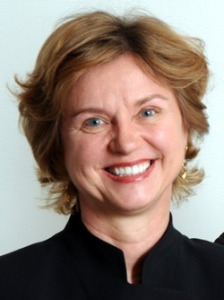Every day individuals, households, and organizations make a large number of decisions that impact the environment in intentional or unintentional ways. Such decisions involve risk, uncertainty, long time-horizons, and distributed responsibility, and Weber will examine the cognitive and motivational barriers in place that often prevent us from making such decisions wisely. Fortunately there are some solutions. Those involve taking advantage of the ways in which people make decisions and to acquire, represent, and process information that go beyond rational deliberation and choice. A better understanding of the abundance of goals that motivate people’s choices and of the ways in which they arrive at their decisions provides entry points to the design of decision environments that help people, households, and organizations make decisions with which they will be more satisfied in the long run.
About the Speaker
 Elke Weber is the Jerome A. Chazen Professor of International Business, Professor of Management and Psychology, and Earth Institute Professor at Columbia University. She is an expert on descriptive models of decision-making under uncertainty and time delay in financial and environmental contexts. At Columbia, she founded and co-directs the Center for Decision Sciences, which generates and facilitates interdisciplinary decision research relevant to the needs of real world decision makers, and the Center for Research on Environmental Decisions, which investigates ways of facilitating human responses to climate change and climate variability and has published a widely-used Climate Change Communications Guide. Together with Ruth Greenspan Bell, she founded and co-leads SUSSTAIN, an NSF-funded program that translates social science insights into interventions in applied settings that result in easier and better decisions about energy use.
Elke Weber is the Jerome A. Chazen Professor of International Business, Professor of Management and Psychology, and Earth Institute Professor at Columbia University. She is an expert on descriptive models of decision-making under uncertainty and time delay in financial and environmental contexts. At Columbia, she founded and co-directs the Center for Decision Sciences, which generates and facilitates interdisciplinary decision research relevant to the needs of real world decision makers, and the Center for Research on Environmental Decisions, which investigates ways of facilitating human responses to climate change and climate variability and has published a widely-used Climate Change Communications Guide. Together with Ruth Greenspan Bell, she founded and co-leads SUSSTAIN, an NSF-funded program that translates social science insights into interventions in applied settings that result in easier and better decisions about energy use.
Her expertise in the decision sciences has been sought out by several advisory committees of the National Academy of Sciences on human dimensions in global change. She served on the American Psychological Association Task Force that issued a report on the Interface between Psychology and Global Climate Change, and was a lead author in Working Group III for the 5th Assessment Report of the U.N. Intergovernmental Panel on Climate Change (IPCC). She is past president of the Society for Neuroeconomics, the Society for Judgment and Decision Making, and the Society for Mathematical Psychology. She is a fellow of the American Psychological Association, the Association for Psychological Science, the Society for Risk Analysis, and was elected to the German National Academy of Sciences.
Elke received her BA in psychology, summa cum laude, from York University in Canada and her MA and PhD from Harvard in Behavior and Decision Analysis. She has held academic positions at the University of Chicago, University of Illinois, and the Ohio State University, and visiting appointments in Europe and the US. She spent fellowship years at the Center for Advanced Studies in the Behavioral Sciences at Stanford, the Russell Sage Foundation in New York, and the Wissenschaftskolleg in Berlin. The University of Basel awarded her an honorary doctorate for her work that differentiates the roles played by subjective perception of risk and risk attitude in risk taking.
About the Marion Jane Girard Lecture Series
The Girard Lectureship was established by Mr. and Mrs. Joseph M. Girard in 1968, in memory of Marion Jane Girard, Mr. Girard’s Mother, for the purpose of annually bringing a distinguished personage in the field of psychology, psychiatry, or mental health to Scripps College to present a lecture or series of lectures in his or her field and to conduct seminars and discussion groups with students and faculty on the general subject matter of said lecture or lectures. It is intended that the ward of each annual Lectureship would result in the publication of a paper written by the designated Lecturer relating to the subject matter of his or her lecture and/or lectures.

